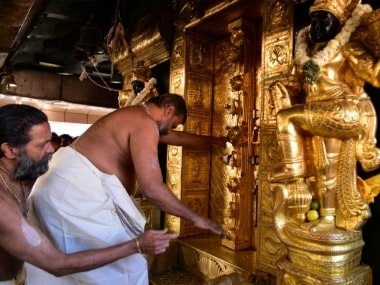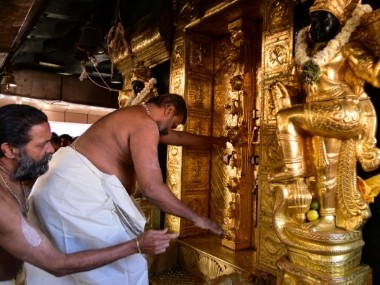Two women made history on Wednesday when they entered the Lord Ayyappa temple in Sabarimala in Kerala. Guarded by the police, 44-year-old Kanakadurga and 42-year-old Bindu offered prayers at the shrine three months after the Supreme Court lifted the ban on the entry of women of menstruating age inside the temple. To break the centuries-old tradition, the two women wore black veils and entered the temple in the early morning darkness. They had began their trek to the hill shrine at midnight and got their darshan around 3.45 am, after which temple authorities shut the shrine to perform a "purification" ritual for an hour. Although the temple officials had been vehemently opposing the 28 September verdict of the Supreme Court, their move to “purify” the temple after the two women offered their prayers at the shrine strongly undermines Justice DY Chandrachud’s observations in the verdict, comparing the practice of barring women from entering the temple to untouchabilty, which is abolished in India under Article 17 of the Constitution. [caption id=“attachment_5826561” align=“alignleft” width=“380”]  A priest closes the doors of sanctum sanctorum for performing religious rituals following the entry of two women in Sabarimala temple on Wednesday. Reuters[/caption] “The social exclusion of women, based on menstrual status, is a form of untouchability, which is anthaema to constitutional values. Notions of ‘purity’ and ‘pollution’, which stigmatise individuals, have no place in a constitutional order,” Chandrachud had observed. “To treat women as children of a lesser god is to blink at the Constitution itself.” “Religion cannot be cover to deny women the right to worship… Exclusion of women because she menstruates is utterly unconstitutional,” he had observed, adding that the prohibition on women was due to “non-religious reasons”. Justice Chandrachud’s observation that “notions of ‘purity’ and ‘pollution’…have no place in a constitutional order” applies in this context as the “purification” ritual that temple priests performed at Sabarimala prima facie is a blatant violation of this order. “Purifying” the temple would imply that by entering the Lord Ayyappa shrine and offering prayers to their god, the women had defiled the shrine and necessitating the “purification” process. This is akin to the treatment meted out to those deemed “untouchables”. For instance, cases where water bodies would be “purified” if an “untouchable” ventured into it. The latest development in Sabarimala is reminiscent of this old practice of ostracising those the society deemed untouchable. By performing the “purification” ritual, the priests reduced the two women to the same abolished status of untouchables. The Chief Justice Dipak Misra-headed Constitution bench had observed in the 4:1 ruling that patriarchy in religion cannot “trump over” devotion. It had also rejected the vehement submissions of the Travancore Devaswom Board, which runs the temple, and ruled that the devotees of Lord Ayyappa are “exclusively Hindus” and do not constitute a “separate religious denomination”. Senior advocate Indira Jaising, in a submission in the case in the Supreme Court, had also said: “The practice of exclusion based on menstruation constitutes a form of untouchability and is prohibited by Article 17 of the Constitution.” Amicus Curiae Raju Ramachandran had also observed that the “prohibition against untouchability in Article 17 extends to the denial of entry to women between the age group of 10 and 50”, which further emphasises the glaring violation this “purification” process was, stigmatising the two women. As news of the two women entering Sabarimala spread, Sangh Parivar outfits took to the streets across Kerala, blocking traffic, burning tyres on main roads and stoning buses. In Thiruvananthapuram, the police used water canons and tear gas to disperse clashing CPM (Communist Party of India-Marxist) and Sangh Parivar activists. Protests were also reported from Kochi, Palghat, Kozhikode and Kasargode. Moreover, Sabarimala Karma Samithi activists vowed not to rest till Chief Minister Pinarayi Vijayan was ousted from office and called a dawn-to-dusk shutdown on Thursday, while CPI appeared to disapprove of the two women of menstruating age group entering the Lord Ayyappa temple at Sabarimala “secretly”, saying they should have done it “openly”. While political parties either spoke out for or against the historic development at Sabarimala, and religious outfits staged protests against it, no group spoke up or even questioned the “purification” ritual that reduced the two women to being deemed as untouchables who had contaminated the Sabarimala temple. Instead, Nair Service Society general-secretary Sukumaran Nair thanked the temple priests for closing the temple for the “purification” ritual, in turn lauding the violation of Justice Chandrachud’s order. Earlier attempts to stop women’s entry On 22 January, the top court is slated to hear review petitions seeking a recall of its judgment. Even though it has refused to stay its verdict till then, several attempts have been made to thwart the entry of women inside Sabarimala since the 28 September ruling. Since the temple opened for monthly prayers in October for the first time since the verdict was pronounced, hardline Ayyappa devotees have foiled the attempts of around a dozen women seeking to enter the shrine. In November, social activist and leader of Bhumata Brigade Trupti Desai's bid was also stalled after she had announced that she would try to enter the temple with a group of women. Protesters, including BJP workers, had held a standoff for over 12 hours at the Kochi airport and vowed to not let Desai proceed to the shrine. The police later asked the activist to return to Pune. Furthermore, a human chain of protesters had forced an 11-member group of devotees from Tamil Nadu to retreat. The team was part of a 40-member group from different states, including Tamil Nadu, Madhya Pradesh, Odisha, Karnataka and Kerala, and their attempt to reach the temple was organised by Manithi, a Chennai-based women’s organisation. Desai — who had led the campaign for women to be allowed to offer prayers in Maharashtra’s Shani Shingnapur temple, Haji Ali Dargah, Mahalakshmi temple and the Trimbakeshwar Shiva temple — hailed the courage of the two women who entered Sabarimala on Wednesday. “This is a big victory for our agitation. A victory of equality… This is a good beginning for women in the new year,” Desai said. There is no data on exactly when girls and women of reproductive age were forbidden from offering prayers at Sabarimala, but according to a 19th-Century British survey, the ban was in place even 200 years ago. The informal restriction got legal ratification and acceptance following a Kerala High Court judgment in 1991. On 5 April, 1991, the court had upheld the ban on women’s entry inside Sabarimala, observing that the restriction was in place since time immemorial and was not discriminatory under the Constitution. With inputs from agencies
By performing the “purification” process at Sabarimala, the temple priests reduced the two women to the abolished status of “untouchables”, implying that they had contaminated the shrine in some way.
Advertisement
End of Article


)

)
)
)
)
)
)
)
)



